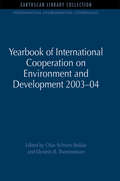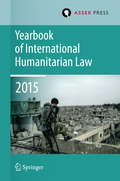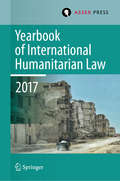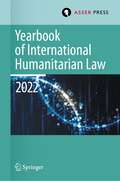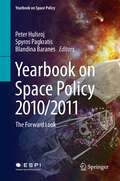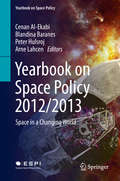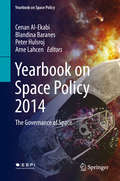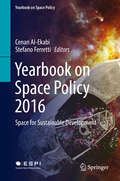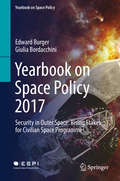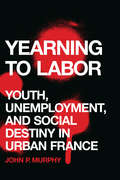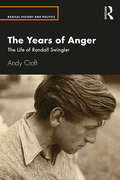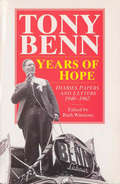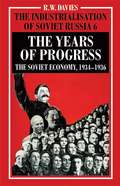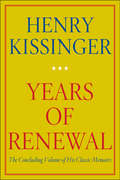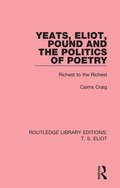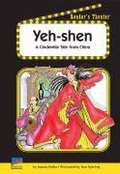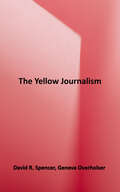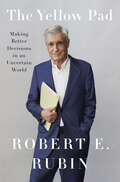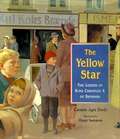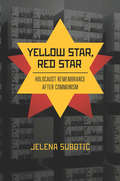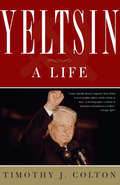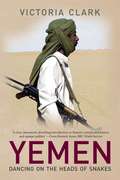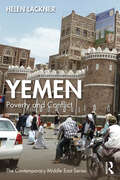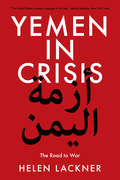- Table View
- List View
Yearbook of International Cooperation on Environment and Development 2003-04: Yearbook Of International Cooperation On Environment And Development 2003-04 (International Environmental Governance Set)
by Olav Schram Stokke Oystein B. Thommessen'The Yearbook's extensive coverage makes a valuable contribution in promoting international co-operation on environment' Xie Zhenhu, Minister of the State Environmental Protection Administration (SEPA) of China 'A vital contribution in terms of reliable research and information on key issues of sustainable development. It constitutes an invaluable tool for facilitating the dialogue among all stakeholders involved in the implementation of the commitments agreed to in the World Summit on Sustainable Development (WSSD)' Ian Johnson World Bank Vice President for Sustainable Development The essential reference to all the rapidly multiplying international agreements on environment and development issues. This ninth annual edition of the Yearbook demonstrates the international community's position on specific environment and development problems, the main obstacles to effective international solutions, and how to overcome them. It assesses both the achievements and shortcomings of co-operation, distinguishing between the rhetoric and the reality of environment world politics. Contents * Current Issues and Key Themes * Agreements on Environment and Development Systematically listed key data and illustrations concerning the most important international agreements presented on the basis of information from the organizations in question and other sources, covering such matters as: objectives ? scope ? time and place of establishment ? status of participation ? affiliated instruments and organizations ? major activities ? secretariat ? finance ? rules and standards ? monitoring and implementation ? decision-making bodies ? key publications ? Internet sources. This edition includes several recently adopted conventions and protocols. * Intergovernmental Organizations (IGOs), including UN specialized agencies objectives ? type of organization ? membership ? date of establishment ? secretariat ? activities ? decision-making bodies ? finance ? key publications ? Internet sources. * International Non-governmental Organizations (NGOs) * objectives ? type of organization ? membership ? date of establishment ? secretariat ? activities ? budget ? key publications ? Internet sources. Originally published in 2003
Yearbook of International Humanitarian Law Volume 18, 2015 (Yearbook of International Humanitarian Law #18)
by Terry D. GillThe general theme of this volume is contemporary armed conflicts and their implications for international humanitarian law. It is elaborated upon in several chapters, dealing with a variety of topics related to, among other things, the situations in Libya, Transnistria, Mexico, Syria/Iraq (Islamic State) and Israel/Gaza. Besides these chapters that can be connected to the general theme, this volume also contains a chapter dedicated to an international criminal law topic (duress), as well as a Year in Review, describing the most important events and legal developments that took place in 2015. The Yearbook of International Humanitarian Law is the world’s only annual publication devoted to the study of the laws governing armed conflict. It provides a truly international forum for high-quality, peer-reviewed academic articles focusing on this crucial branch of international law. Distinguished by contemporary relevance, the Yearbook of International Humanitarian Law bridges the gap between theory and practice and serves as a useful reference tool for scholars, practitioners, military personnel, civil servants, diplomats, human rights workers and students.
Yearbook of International Humanitarian Law, Volume 20, 2017 (Yearbook of International Humanitarian Law #20)
by Terry D. Gill Tim McCormack Robin Geiß Heike Krieger Christophe PaulussenThe main theme of this volume of the Yearbook of International Humanitarian Lawis the development and interpretation of international humanitarian law (IHL). It iselaborated upon in several chapters that examine the role of non-state armed groupsin the development and interpretation of IHL, the impact of international criminal lawon the development of IHL, the notion of external non-international armed conflicts,and the regulation of prolonged occupation under international law.The second theme of this volume is dedicated to targeting in armed conflicts. Specifictopics include precautions in attack in urban and siege warfare, the targeting of theIslamic State’s religious personnel in Iraq and Syria, and the targeting of illicit cropsthrough aerial spraying in Colombia. Besides the chapters that address both themes,this volume also contains a Year in Review describing the most important events andlegal developments that took place in 2017.The Yearbook of International Humanitarian Law is the world’s only annual publicationdevoted to the study of the laws governing armed conflict. It provides a truly internationalforum for high-quality, peer-reviewed academic articles focusing on this crucialbranch of international law. Distinguished by contemporary relevance, the Yearbookof International Humanitarian Law bridges the gap between theory and practice andserves as a useful reference tool for scholars, practitioners, military personnel, civilservants, diplomats, human rights workers and students.
Yearbook of International Humanitarian Law, Volume 25: International Humanitarian Law and Neighbouring Frameworks (Yearbook of International Humanitarian Law #25)
by Heike Krieger Pablo Kalmanovitz Eliav Lieblich Stavros Evdokimos PantazopoulosVolume 25 of the Yearbook of International Humanitarian Law (IHL) sheds light on the interplay between IHL and other adjacent branches of international law. This Volume moves beyond the traditional preoccupation of examining IHL’s relations with international human rights law, the law on the use of force and international criminal law. Authors were invited to discuss, both in general and specific terms, doctrinally and theoretically, interactions between IHL and other neighbouring frameworks. Accordingly, this Volume is dedicated to exploring the interrelationship between IHL and other adjacent frameworks, such as international environmental law, international investment law, the law on defences to state responsibility, and counter-terrorism law.The Volume contains four articles dedicated to the subject of IHL and neighbouring frameworks. The Volume further features a Focus section on IHL controversies arising from Russia’s aggression against Ukraine, and ends, as usual, with a Year in Review section.The Yearbook of International Humanitarian Law is a leading annual publication devoted to the study of international humanitarian law. The Yearbook has always strived to be at the forefront of the debate of pressing doctrinal questions of IHL, and will continue to do so in the future. As this Volume demonstrates, it offers a space where IHL-related issues can be explored both from a doctrinal and a theoretical perspective. It provides an international forum for high-quality, peer-reviewed academic articles focusing on this crucial branch of international law.Distinguished by contemporary relevance, the Yearbook of International Humanitarian Law bridges the gap between theory and practice and serves as a useful reference tool for scholars, practitioners, military personnel, civil servants, diplomats, human rights workers, and students.
Yearbook on Space Policy 2010/2011
by Peter Hulsroj Blandina Baranes Spyros PagkratisThe Yearbook on Space Policy is the reference publication analysing space policy developments. Each year it presents issues and trends in space policy and the space sector as a whole. Its scope is global and its perspective is European. The Yearbook also links space policy with other policy areas. It highlights specific events and issues, and provides useful insights, data and information on space activities. The Yearbook on Space Policy is edited by the European Space Policy Institute (ESPI) based in Vienna, Austria. It combines in-house research and contributions of members of the European Space Policy Research and Academic Network (ESPRAN), coordinated by ESPI. The Yearbook is designed for government decision-makers and agencies, industry professionals, as well as the service sectors, researchers and scientists and the interested public.
Yearbook on Space Policy 2011/2012
by Arne Lahcen Peter Hulsroj Blandina Baranes Cenan Al-EkabiThe Yearbook on Space Policy is the reference publication analyzing space policy developments. Each year it presents issues and trends in space policy and the space sector as a whole. Its scope is global and its perspective is European. The Yearbook also links space policy with other policy areas. It highlights specific events and issues, and provides useful insights, data and information on space activities. The Yearbook on Space Policy is edited by the European Space Policy Institute (ESPI) based in Vienna, Austria. It combines in-house research and contributions of members of the European Space Policy Research and Academic Network (ESPRAN), coordinated by ESPI. The Yearbook is designed for government decision-makers and agencies, industry professionals, as well as the service sectors, researchers and scientists and the interested public.
Yearbook on Space Policy 2014
by Cenan Al-Ekabi Blandina Baranes Peter Hulsroj Arne LahcenThe Yearbook on Space Policy, edited by the European Space Policy Institute (ESPI), is the reference publication analysing space policy developments. Each year it presents issues and trends in space policy and the space sector as a whole. Its scope is global and its perspective is European. The Yearbook also links space policy with other policy areas. It highlights specific events and issues, and provides useful insights, data and information on space activities. The first part of the Yearbook sets out a comprehensive overview of the economic, political, technological and institutional trends that have affected space activities. The second part of the Yearbook offers a more analytical perspective on the yearly ESPI theme and consists of external contributions written by professionals with diverse backgrounds and areas of expertise. The third part of the Yearbook carries forward the character of the Yearbook as an archive of space activities. The Yearbook is designed for government decision-makers and agencies, industry professionals, as well as the service sectors, researchers and scientists and the interested public.
Yearbook on Space Policy 2016: Space For Sustainable Development (Yearbook On Space Policy Ser.)
by Stefano Ferretti Cenan Al-EkabiThe Yearbook on Space Policy, edited by the European Space Policy Institute (ESPI), is the reference publication analysing space policy developments. Each year it presents issues and trends in space policy and the space sector as a whole. Its scope is global and its perspective is European. The Yearbook also links space policy with other policy areas. It highlights specific events and issues, and provides useful insights, data and information on space activities. The first part of the Yearbook sets out a comprehensive overview of the economic, political, technological and institutional trends that have affected space activities. The second part of the Yearbook offers a more analytical perspective on the yearly ESPI theme and consists of external contributions written by professionals with diverse backgrounds and areas of expertise. The third part of the Yearbook carries forward the character of the Yearbook as an archive of space activities. The Yearbook is designed for government decision-makers and agencies, industry professionals, as well as the service sectors, researchers and scientists and the interested public.
Yearbook on Space Policy 2017: Security in Outer Space: Rising Stakes for Civilian Space Programmes (Yearbook on Space Policy)
by Giulia Bordacchini Edward BurgerThe book describes the recent trends in space policy and the space sector overall. While maintaining a global scope with a European perspective, it links space policy with other policy areas, highlights major events, and provides insights on the latest data. The Yearbook includes the proceedings of ESPI's 12th Autumn Conference, which discussed the growing importance of Security in Outer Space and the stakes for civilian space programmes in the public and private sectors. Bringing together satellite operators, SMEs, European and American institutions, and think tanks, the Autumn Conference served as platform for fresh insights on security in outer space and the potential of transatlantic relations to address its challenges. The Yearbook also includes executive summaries of ESPI's work in 2017 as well as ESPI's 2017 Executive Briefs, covering topics such as suborbital spaceflight, super heavy lift launch vehicles, collaboration with China, and the delimitation of outer space. All in all, the book gives a detailed review of space policy developments worldwide, contextualised with information about national-level space industries and activity and broader political and economic conditions. The readership is expected to include the staff of space agencies, the space industry, and the space law and policy research community.
Yearning to Labor: Youth, Unemployment, and Social Destiny in Urban France
by John P. MurphyIn the first decade of the twenty-first century, France underwent a particularly turbulent period during which urban riots in 2005 and labor protests in 2006 galvanized people across the country and brought the question of youth unemployment among its poorer, multiethnic outer cities into the national spotlight. Drawing on more than a year of ethnographic field research in the housing projects of the French city of Limoges, Yearning to Labor chronicles the everyday struggles of a group of young people as they confront unemployment at more than triple the national rate—and the crushing despair it engenders. Against the background of this ethnographic context, John P. Murphy illuminates how the global spread of neoliberal ideologies and practices is experienced firsthand by contemporary urban youths in the process of constructing their identities. An original investigation of the social ties that produce this community, Yearning to Labor explores the ways these young men and women respond to the challenges of economic liberalization, deindustrialization, and social exclusion. At its heart, Yearning to Labor asks if the French republican model of social integration, assimilation, and equality before the law remains viable in a context marked by severe economic exclusion in communities of ethnic and religious diversity. Yearning to Labor is both an ethnographic account of a certain group of French youths as they navigate a suffocating job market and an analysis of the mechanisms underlying the shifting economic inequalities at the beginning of the twenty-first century.
The Years of Anger: The Life of Randall Swingler (Routledge Studies in Radical History and Politics)
by Andy CroftRandall Swingler (1909–67) was arguably the most significant and the best-known radical English poet of his generation. A widely published poet, playwright, novelist, editor and critic, his work was set to music by almost all the major British composers of his time. This new biography draws on extensive sources, including the security services files, to present the most detailed account yet of this influential poet, lyricist and activist. A literary entrepreneur, Swingler was founder of radical paperback publishing company Fore Publications, editor of Left Review and Our Time and literary editor of the Daily Worker; later becoming a staff reporter, until the paper was banned in 1941. In the 1930s, he contributed several plays for Unity Theatre, including the Mass Declamation Spain, the Munich play Crisis and the revues Sandbag Follies and Get Cracking. In 1936, MI5 opened a 20-year-long file on him prompted by a song he co-wrote with Alan Bush for a concert organised to mark the arrival of the 1934 Hunger March into London. During the Second World War, Swingler served in North Africa and Italy and was awarded the Military Medal for his part in the battle of Lake Comacchio. His collections The Years of Anger (1946) and The God in the Cave (1950) contain arguably some of the greatest poems of the Italian campaign. After the war, Swingler was blacklisted by the BBC. Orwell attacked him in Polemic and included him in the list of names he offered the security services in 1949. Stephen Spender vilified him in The God That Failed. The book will challenge the Cold War assumptions that have excluded Swingler’s life and work from standard histories of the period and should be of great interest to activists, scholars and those with an interest in the history of the literary and radical left.
Years Of Hope: Diaries, Letters and Papers 1940-1962
by Tony BennYEARS OF HOPE is a kind of 'prequel' to the published series of DIARIES, and will cover fully the peerage renunciation, as well as revealing his early career, touching on schooldays, RAF service during the war, early involvement with politics etc. As a young man he had dealings with Atlee, Bevan, Morrison, Gaitskill and all the major politicians of the post-war Labour Government. This book will be more personal than earlier volumes and will draw on letters and other documents as well as the DIARIES themselves. It will reveal the extraordinary consistency of Benn's political views, as well as showing how he came to acquire them.
The Years of Progress
by R. W. Davies Oleg Khlevnyuk Stephen G. WheatcroftBased on extensive research in formerly secret archives, this volume examines the progress of Soviet industrialisation against the background of the rising threat of aggression from Germany, Japan and Italy, and the consolidation of Stalin's power.
Years of Renewal
by Henry KissingerPerhaps the best-known American diplomatist of the twentieth century, Henry Kissinger is a major figure in world history, winner of the Nobel Peace Prize, and arguably one of the most brilliant minds ever placed at the service of American foreign policy, as well as one of the shrewdest, best-informed, and most articulate men ever to occupy a position of power in Washington. The eagerly awaited third and final volume of his memoirs completes a major work of contemporary history. It is at once an important historical document and a brilliantly told narrative of almost Shakespearean intensity, full of startling insights, unusual (and often unsparing) candor, and a sweeping sense of history. Years of Renewal is the triumphant conclusion of a major achievement and a book that will stand the test of time as a historical document of the first rank.
Yeats, Eliot, Pound and the Politics of Poetry: Richest to the Richest (Routledge Library Editions: T. S. Eliot #2)
by Cairns Prof. CraigIt has long been recognised that there is an apparently paradoxical relationship between the revolutionary poetic style developed by Yeats, Eliot and Pound in the period during and after the First World War, and the reactionary politics with which they were associated in the 1920s and 1930s. Concentrating on their writings in the period up to the 1930s, this study, first published in 1982, helps to resolve the paradox and also provides a much needed reappraisal of the factors influencing their poetic and political development. The work of these poets has usually been seen as deriving from the tradition of continental symbolist poetics. Yeats, Eliot, Pound and the Politics of Poetry will be of interest to students of literature.
Yeh-shen: A Cinderella Tale from China
by Joanna Korba Tom Sperling Jeffrey FuerstPerform this Cinderella tale from China.
The Yellow Journalism: The Press and America's Emergence as a World Power
by David R. SpencerWhen a case containing dismembered human remains surfaced in New York's East River in June of 1897, the publisher of the New York Journal--a young, devil-may-care millionaire named William Randolph Hearst--decided that his newspaper would "scoop" the city's police department by solving this heinous crime. Pulling out all the stops, Hearst launched more than a journalistic murder investigation; his newspaper's active intervention in the city's daily life, especially its underside, marked the birth of the Yellow Press. <p><p>In a work that studies the rise and fall of this phenomenon, David R. Spencer documents the fierce competition that characterized yellow journalism, the social realities and trends that contributed to its success (and its ultimate demise), its accomplishments for good or ill, and its long-term legacy. Most notable among Hearst's competitors was New York City's The World, owned and managed by a European Jewish immigrant named Joseph Pulitzer. The Yellow Journalism describes how these two papers and others exploited the scandal, corruption, and crime among the city's most influential citizens, and its most desperate inhabitants--a policy that made this "journalism of action" remarkably effective, not just as a commercial force, but also as an advocate for the city's poor and defenseless. <p><p>Spencer shows how many of the innovations first introduced during this period--from investigative reporting to the use of color, entertainment news, and cartoons in papers--have had a lasting effect on journalism; and how media in our day reflects the Yellow Press's influence, but also its threatened irrelevance within the broader realities of contemporary society.
The Yellow Pad: Making Better Decisions in an Uncertain World
by Robert E. RubinRobert Rubin, former secretary of the Treasury and co-chairman of Goldman Sachs, shares thoughts on decision-making developed over more than six decades in markets, business, government, and politics, and offers readers an astute and original guide for navigating uncertain timesIn 1958, as a college sophomore, Robert Rubin took a class that changed his life. The class was introduction to philosophy, and the professor, Raphael Demos, instilled in his students an idea that was simple yet profound: There is no such thing as certainty. For Rubin, this led to a critically important question: How can we make sound decisions in a fundamentally uncertain world?While serving in some of the most significant roles in markets, business, and government, Rubin has grappled with that question. Time and again, when faced with a high-stakes decision, he turned to his most trusted tool: a simple yellow legal pad. Rubin&’s yellow pad (or more recently, his iPad) became an expression of a larger decision-making philosophy that has both lasted and shaped a lifetime. In The Yellow Pad, Rubin lays out that philosophy with depth and detail, and presents a compelling intellectual framework for confronting some of the most difficult issues we face today.The Yellow Pad contains a former Treasury secretary&’s approach to economic policymaking. A former Goldman Sachs senior partner&’s approach to personal investing and understanding risk. A former director of the National Economic Council&’s approach to managing people in both private- and public-sector organizations. And much more. Yet despite his lifetime of experiences, Rubin remains refreshingly open-minded, interested in exploring ideas rather than promoting ideologies. With its combination of wisdom and relevance, The Yellow Pad is an essential guide for anyone looking to make better decisions in life, work, and public policy.
The Yellow Star: The Legend of King Christian X of Denmark
by Carmen Agra Deedy Henri SorensenWithout the yellow star to point them out, the Jews looked like any other Danes. For centuries, the Star of David was a symbol of Jewish pride. But during World War II, Nazis used the star to segregate and terrorize the Jewish people. Except in Denmark. When Nazi soldiers occupied his country, King Christian X of Denmark committed himself to keeping all Danes safe from harm. The bravery of the Danes and their king during that dangerous time has inspired many legends. The most enduring is the legend of the yellow star, which symbolizes the loyalty and fearless spirit of the king and his people. Award-winning author and storyteller Carmen Deedy has poignantly recreated this legend, which is accompanied by Danish illustrator Henri Sørensen's arresting full-color portraits. The result is a powerful and dignified story of heroic justice, a story for all people and all times.
Yellow Star, Red Star: Holocaust Remembrance after Communism
by Jelena SubotićYellow Star, Red Star asks why Holocaust memory continues to be so deeply troubled—ignored, appropriated, and obfuscated—throughout Eastern Europe, even though it was in those lands that most of the extermination campaign occurred. As part of accession to the European Union, Jelena Subotić shows, East European states were required to adopt, participate in, and contribute to the established Western narrative of the Holocaust. This requirement created anxiety and resentment in post-communist states: Holocaust memory replaced communist terror as the dominant narrative in Eastern Europe, focusing instead on predominantly Jewish suffering in World War II. Influencing the European Union's own memory politics and legislation in the process, post-communist states have attempted to reconcile these two memories by pursuing new strategies of Holocaust remembrance. The memory, symbols, and imagery of the Holocaust have been appropriated to represent crimes of communism.Yellow Star, Red Star presents in-depth accounts of Holocaust remembrance practices in Serbia, Croatia, and Lithuania, and extends the discussion to other East European states. The book demonstrates how countries of the region used Holocaust remembrance as a political strategy to resolve their contemporary "ontological insecurities"—insecurities about their identities, about their international status, and about their relationships with other international actors. As Subotić concludes, Holocaust memory in Eastern Europe has never been about the Holocaust or about the desire to remember the past, whether during communism or in its aftermath. Rather, it has been about managing national identities in a precarious and uncertain world.
The Yellow Wall-paper, Herland, and Selected Writings
by Charlotte Perkins GilmanWonderfully sardonic and slyly humorous, the writings of landmark American feminist and socialist thinker Charlotte Perkins Gilman were penned in response to her frustrations with the gender-based double standard that prevailed in America as the twentieth century began. Perhaps best known for her chilling depiction of a woman's mental breakdown in her unforgettable 1892 short story 'The Yellow Wall-Paper', Gilman also wrote Herland, a wry novel that imagines a peaceful, progressive country from which men have been absent for 2,000 years. Both are included in this volume, along with a selection of Gilman's major short stories and her poems.
Yeltsin: A Life
by Timothy J. ColtonEven after his death in April 2007, Boris Yeltsin remains the most controversial figure in recent Russian history. Although Mikhail Gorbachev presided over the decline of the Communist party and the withdrawal of Soviet control over eastern Europe, it was Yeltsin-Russia’s first elected president-who buried the Soviet Union itself. Upon taking office, Yeltsin quickly embarked on a sweeping makeover of newly democratic Russia, beginning with a program of excruciatingly painful market reforms that earned him wide acclaim in the West and deep recrimination from many Russian citizens. In this, the first biography of Yeltsin’s entire life, Soviet scholar Timothy Colton traces Yeltsin’s development from a peasant boy in the Urals to a Communist party apparatchik, and then ultimately to a nemesis of the Soviet order. Based on unprecedented interviews with Yeltsin himself as well as scores of other Soviet officials, journalists, and businessmen, Colton explains how and why Yeltsin broke with single-party rule and launched his drive to replace it with democracy. Yeltsin’s colossal attempt to bring democracy to Russia remains one of the great, unfinished stories of our time. As anti-Western policies and rhetoric resurface in Putin’s increasingly bellicose Russia, Yeltsin offers essential insights into the past, present, and future of this vast and troubled nation.
Yemen: Dancing on the Heads of Snakes
by Victoria ClarkYemen is the dark horse of the Middle East. Every so often it enters the headlines for one alarming reason or another--links with al-Qaeda, kidnapped Westerners, explosive population growth--then sinks into obscurity again. But, as Victoria Clark argues in this riveting book, we ignore Yemen at our peril. The poorest state in the Arab world, it is still dominated by its tribal makeup and has become a perfect breeding ground for insurgent and terrorist movements. Clark returns to the country where she was born to discover a perilously fragile state that deserves more of our understanding and attention. On a series of visits to Yemen between 2004 and 2009, she meets politicians, influential tribesmen, oil workers and jihadists as well as ordinary Yemenis. Untangling Yemen's history before examining the country's role in both al-Qaeda and the wider jihadist movement today, Clark presents a lively, clear, and up-to-date account of a little-known state whose chronic instability is increasingly engaging the general reader.
Yemen: Poverty and Conflict (The Contemporary Middle East)
by Helen LacknerFocusing on the fundamental reasons underlying the lasting crisis of the Yemeni Civil War, this book frames contemporary Yemen and assesses prospects beyond the conflict, identifying the factors which will determine its future internal and international characteristics. Building on Helen Lackner’s profound experience in Yemen, this volume discusses Yemen’s history and state formation, the main political institutions emerging since the Republic of Yemen was established and their role in the war, including the significance of current fragmentation. The volume goes on to discuss climate change, including the water scarcity issue, in the context of resource constraints to economic development and the role of migration. Rural and urban life, as well as the impact of international development and humanitarian aid, are also covered, together with Yemen’s international relations – its interaction with its neighbours as well as Western states. Looking forward, it suggests the type of policies able to give Yemenis the conditions needed for a reasonable standard of living. Thanks to analysis of determining events, the book will appeal to politicians, diplomats, humanitarian organizations, security analysts, researchers on the Middle East and those generally interested in Yemen. It will also be an essential text for students of international relations, political economy, failing states, development studies and contemporary Middle Eastern history.
Yemen in Crisis: Road to War
by Helen LacknerExpert analysis of Yemen's social and political crisis, with profound implications for the fate of the Arab World The democratic promise of the 2011 Arab Spring has unraveled in Yemen, triggering a disastrous crisis of civil war, famine, militarization, and governmental collapse with serious implications for the future of the region. Yet as expert political researcher Helen Lackner argues, the catastrophe does not have to continue, and we can hope for and help build a different future in Yemen.Fueled by Arab and Western intervention, the civil war has quickly escalated, resulting in thousands killed and millions close to starvation. Suffering from a collapsed economy, the people of Yemen face a desperate choice between the Huthi rebels on the one side and the internationally recognized government propped up by the Saudi-led coalition and Western arms on the other. In this invaluable analysis, Helen Lackner uncovers the roots of the social and political conflicts that threaten the very survival of the state and its people. Importantly, she argues that we must understand the roots of the current crisis so that we can hope for a different future for Yemen and the Middle East.With a preface exploring the US’s central role in the crisis.
